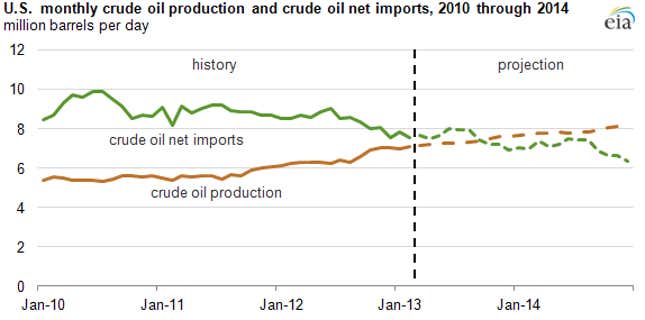
This year, for the first time since 1995, the US will at some point be producing more crude than it imports, the government points out today. This is largely due to the boom in shale oil production resulting from fracking, a relatively new drilling technique. But the oil isn’t just helping reduce America’s dependence on foreign sources; it’s making it cheaper for American manufacturers to get the energy they need. By this telling, the energy boom could lead to a factory boom.
Or will it? JP Morgan chief economist Michael Feroli fears that “Dutch disease” could hinder American manufacturing. The name comes from the Netherlands’ experience in the sixties and seventies, when offshore petroleum discoveries lead to an oil export boom that drove up the value of the guilder, making Dutch goods sold abroad more expensive and leading to the decline of manufacturing. Other countries’ resource booms have had similar results. While the US isn’t about to become a net exporter any time soon, it will sell more oil abroad and that will put upward pressure on the dollar.
The question, then, is whether the costs of a stronger dollar outweigh the benefits of cheaper energy. JP Morgan’s economists estimate that an oil boom could increase the value of America’s trade-weighted dollar some 0.5%. To offset that, they say, American manufacturer’s energy costs would need to fall 26%, a very tall order indeed—they have increased 2.5% a year over the last five years, and in the recession they only dropped 16%. To Feroli’s mind, that’s a forecast for a mild case of Dutch disease.
It’s not necessarily the end of the world. Advanced economies with strong political institutions can pre-empt Dutch disease with investments that make their manufacturing sector more competitive. In Canada, managing its own petroleum boom, future Bank of England chairman Mark Carney makes the case that Dutch disease is less important than adjusting to structural changes in the global economy. That means manufacturing is going to be a smaller sector regardless.
In other words, places like the United States and Canada are heading for a more post-industrial future, even if they enjoy a sudden surge in natural resource wealth. The real question is how much that wealth can ease their transition.